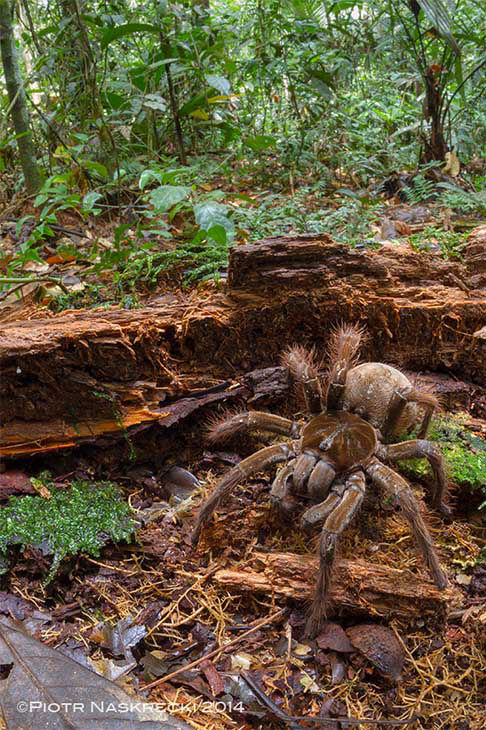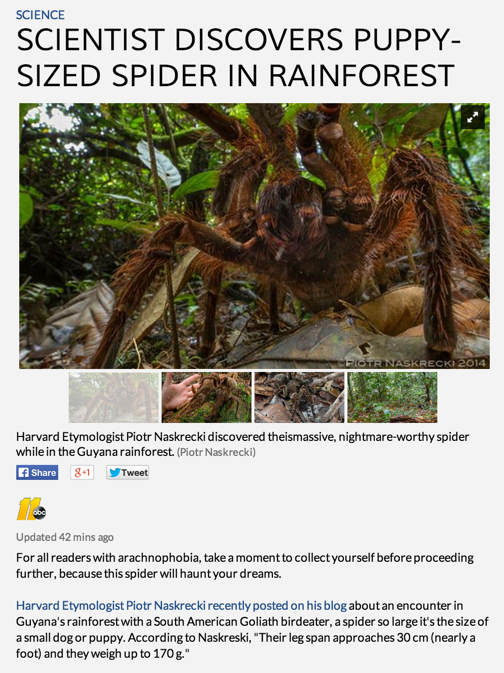Etymology in the rain forest
« previous post | next post »
 "Scientist discovers puppy-sized spider in rain forest", ABC 11 Eyewitness News 10/20/2014:
"Scientist discovers puppy-sized spider in rain forest", ABC 11 Eyewitness News 10/20/2014:
For all readers with arachnophobia, take a moment to collect yourself before proceeding further, because this spider will haunt your dreams.
Harvard Etymologist Piotr Naskrecki recently posted on his blog about an encounter in Guyana's rainforest with a South American Goliath birdeater, a spider so large it's the size of a small dog or puppy. According to Naskreski, "Their leg span approaches 30 cm (nearly a foot) and they weigh up to 170 g."
More of the spider's endearing characteristics:
As Naskrecki describes his encounter with the spider, it truly comes across as the stuff of nightmares. "The spider would start rubbing its hind legs against the hairy abdomen. 'Oh, how cute!', I thought when I first saw this adorable behavior, until a cloud of urticating hair hit my eyeballs, and made me itch and cry for several days." The Etymologist goes into further detail saying the spider was "capable of puncturing a mouse's skull, and would try to jab me with the pointy implements," and that it produced a large hissing sound.
Of course, Piotr Naskrecki is an entomologist rather than an etymologist, and he encountered the Goliath birdeater rather than discovering it (it was known in the early 18th century if not before), but hey, journamalism.
Obligatory screenshot:

[h/t Charles Hallinan]
David Morris said,
October 20, 2014 @ 4:43 pm
It bugs me when people get those two words mixed up!
Nathan said,
October 20, 2014 @ 5:03 pm
Don't the two words have pretty much the same entomology?
Rubrick said,
October 20, 2014 @ 5:12 pm
Change fields instantly using this one weird trick!
maidhc said,
October 20, 2014 @ 6:45 pm
It rather reminds me of a certain musician whose publicity material claimed that they discovered an 18th century tune collection in a Scottish castle. A tune collection that was printed and sold in the 18th century and then reprinted in a facsimile edition in the 20th century. Might well have "discovered" it in the gift shoppe of the castle.
Blame the headline writer for this one though.
William Steed said,
October 20, 2014 @ 7:27 pm
Is the -ma- infix another Simpsons-origin productive morpheme? The first time I ever encountered it was in an early episode where Homer inserts it into saxo-ma-phone. He also does a similar one in 'tra-ma-mpoline' (though with a different phoneme for the vowel in the infix.
But what meaning to ascribe to it?
Sara Scharf said,
October 20, 2014 @ 8:03 pm
@William Steed,
The -ma- infix is at least decades older. It's in several Dr. Seuss books, including (if I remember correctly), "If I Ran the Zoo" (1950).
Ben Zimmer said,
October 20, 2014 @ 9:03 pm
Well, "Horton Hears a Who" (the 1970 film version) had a "Xylomaphone," and "The Lorax" (1971) had a "Whisper-ma-Phone." But the earliest example I've found is "edumacation"/"edumacated" (often associated with "Popeye"), which dates back to 1925 at least.
(For the Simpsonian usage, see Alan Yu's paper on Homeric infixation.)
Lugubert said,
October 20, 2014 @ 9:28 pm
I have said for years that entymology studies insect names.
mike said,
October 20, 2014 @ 10:20 pm
They've fixed it, sad to say.
Keith said,
October 21, 2014 @ 1:54 am
:rolleyes:
How can a piss-poor web scribbler offend? Let us count the ways…
1. Confusing entomology with etymology.
2. Dumbing down the topic.
3. Misspelling the name of the main person in the story.
4. Confusing "discovery" with "encounter".
5. Failing to correct simply typing errors ("theismassive").
time to stop, I think
K.
pj said,
October 21, 2014 @ 4:42 am
What's the difference between an etymologist and an entomologist?
An etymologist knows.
orin ed deniro said,
October 21, 2014 @ 4:46 am
While Piotr Naskrecki is not an etymologist, that doesn't make him an entomologist.
An entomologist is a scientist who studies insects.
A spider is not an insect. For one thing, insects, if they have legs, have six of them. Spiders have eight legs.
If Piotr Naskrecki limits his science to the study of spiders, he is an arachnologist.
Bill Benzon said,
October 21, 2014 @ 5:24 am
Am I the only one who learned a new word: "urticating"?
Mrs Tilton said,
October 21, 2014 @ 6:17 am
If Piotr Naskrecki had to find out about urticating hairs the hard way, he's probably not an arachnologist.
Alan Palmer said,
October 21, 2014 @ 8:25 am
I'm quite happy with the use of discover to mean simply 'find unexpectedly' or 'come across'. Entomologists and arachnologists may sometimes find species of insects or spiders new to science, but I'm sure that's not the totality of their work.
djw said,
October 21, 2014 @ 8:36 am
Bill Benson–No, you are not alone; I don't think I'd ever seen it before, either.
Keith–Did you mean "simply," or did you fall prey to that phenomenon that seems to plague anyone who comments on others' errors? (I think there's a name for it–Muphrey's law?–but I don't remember it.)
GeorgeW said,
October 21, 2014 @ 9:07 am
"The -ma- infix is at least decades older. It's in several Dr. Seuss books"
"Thingamajig" dates to early 19th century and "thingamabob" to early 18th century.
EnvGen said,
October 21, 2014 @ 11:02 am
Of course there's an XKCD for this.
Robert Coren said,
October 21, 2014 @ 11:03 am
When I saw this originally on Facebook, it brought up a 50-year-old memory of an advertisement in The New Yorker, part of a series (I have no recollection what the product was) taking the form of humorous essays by author Max Shulman, which began thus: "Today, class, our subject is etymology (or entomology, as it is sometimes called), which is the study of words (or insects, as they are sometimes called)."
Efrem said,
October 21, 2014 @ 1:18 pm
Speaking for all arachnophobics "Put your warning in the title"
I read your blog through rss and the first thing to show is the title, the second a huge picture of a spider… Oh boy. It's one of those days.
Mark Mandel said,
October 21, 2014 @ 2:33 pm
Mark Mandel said,
October 21, 2014 @ 2:34 pm
Muphry's Law strikes again! I tried to include an appropriate icon, and …
Tom Parmenter said,
October 21, 2014 @ 7:33 pm
Max Shulman's humorous ads for, I believe, Chesterfield cigarets, were a financial mainstay of college papers in the late 50s and early 60s (after the 50s and before the 60s, as it were).
Jason said,
October 22, 2014 @ 12:26 am
As Orin points out, entomologist or not, his encounter with a spider would be in his capacity as an arachnologist. Entomologists studies insects; spiders are in the completely different Arachnid familiy. So it's a double mistake.
It appears Piotr Naskrecki is actually an entomologist, but it's misleading as it implies spiders are in his jurisdiction. When his blog makes it clear he went to an arachnologist for the dope on these creatures. Mental Floss made the same mistake with their article "Even entomologists are afraid of spiders" — well, unsurprising, they don't study spiders.
Keith said,
October 22, 2014 @ 3:46 am
@djw
Of course, it's something like that. Mphrey's or Cfafrey's, maybe.
Robert Coren said,
October 22, 2014 @ 10:10 am
@Jason: If we're going to insist for the sake of accuracy that entomologists don't study spiders, then I guess it's OK for me to pick nits, as it were, and point out that insects and arachnids are not separate families, but separate classes, which is a couple of taxonomic levels higher.
January First-of-May said,
October 22, 2014 @ 3:10 pm
@GeorgeW: Lewis Carroll spells it, in The Hunting of the Snark, as "Thing-um-a-jig" – hyphens included – so if that's even an infix there, it's probably not -ma-. (The other word's earlier attestations mainly consist of versions like "thing-'em bob" and "Thingum Bob", which makes a -ma- infix even less likely.)
Earliest mention of the "entomology/etymology" pun that I can think of is in the classic How to tell the Birds from the Flowers (first edition 1907). Pretty sure someone made such a joke even earlier.
As for "entymology"… in Russia, there's such a thing as Norman's Entymological Dictionary – a list of whimsical reinterpretations of already-existing words (apparently the English term for such reinterpretations is "daffynition", or possibly "goofinition").
Georgew said,
October 22, 2014 @ 3:33 pm
January First-of-May:
According to the OED: Brit. /ˈθɪŋəmᵻdʒɪɡ/ , U.S. /ˈθɪŋəməˌdʒɪɡ/
Spelling in the OED: thingamajig
Jen said,
October 22, 2014 @ 4:19 pm
Worse than "etymologist" here is "puppy-sized"! What puppy weighs 170g? According to Wikipedia, an average male rat weighs 350g. So this spider is about half the size of a male rat. It's a large spider, certainly, but not the size of all but the tiniest puppy. (The internet indicates that a one-week-old chihuahua is on the order of 170g…)
ET said,
October 22, 2014 @ 10:48 pm
What Jen said.
Thomas Thurman said,
October 22, 2014 @ 11:10 pm
Urticating hairs are found only on tarantulas from the Americas, and I've always suspected that it accounts for those spiders being so much more docile than Old World tarantulas. (I keep South American tarantulas, and they've all been pretty chilled-out creatures.) If some great blundering mammal comes and sniffs at you, and then runs away with your stinging hairs stuck to its nose, vowing never to go near a spider again, then you don't need to defend yourself by biting it. And that's good, because it means you can save your venom for killing your lunch.
Terry Hunt said,
October 23, 2014 @ 10:17 am
@ Jen & ET
I think you're confusing the concepts of weight and size. Arachnids and most other arthropods have quite a low density compared to vertebrates, so yes, puppies are generally heavier than 170g, but the spider in question has a leg span of "nearly a foot", which is in the same ballpark as the linear measurements of many puppies and a few small-breeds' adults.
(My own former speciality was Astronomy where, in some circumstances, being within a factor of 1000 was considered close enough :-) .)
Robert Coren said,
October 23, 2014 @ 10:42 am
@Jen: Well, "-sized" is a somewhat ambiguous term. I could imagine that the span between opposite legs of the spider might approach the nose-to-tail length of a (small) puppy without the spider's weight being anything like the puppy's.